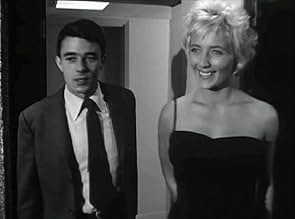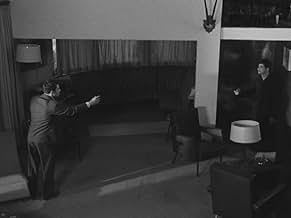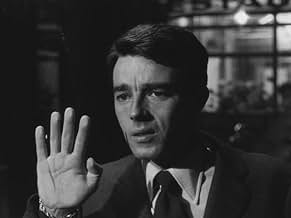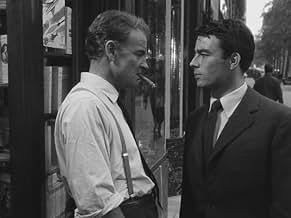VALUTAZIONE IMDb
7,2/10
3437
LA TUA VALUTAZIONE
Aggiungi una trama nella tua linguaA pair of cousins share a flat, but animosity begins to build between the two when a woman gets involved.A pair of cousins share a flat, but animosity begins to build between the two when a woman gets involved.A pair of cousins share a flat, but animosity begins to build between the two when a woman gets involved.
- Regia
- Sceneggiatura
- Star
- Premi
- 1 vittoria in totale
Recensioni in evidenza
This film by Claude Chabrol reminds me of the old story of the country mouse and the city mouse. The country mouse is excited to see the big city but his bumbling provincial ways are out of step with his more sophisticated city cousin. This seems to be pretty much the basis for this film, "Les Cousins"! Though of course, being a Chabrol film it will have some dark edges and twists!
Charles is the guy raised in the country. He's slow and lacks confidence with women. Paul, on the other hand, was raised in the city and women hang all over him and put out like crazy for him. When Charles comes to stay with him while he goes to college, he is quite the contrast to Paul who is a confident ladies' man. He's also more bookish and introspective than Paul. All Paul wants is to have a good time and have sex--and he couldn't care less about his studies at the college. And, in a way, Paul has contempt for his cousin when Charles falls head over heels for Florence--and he soon beds Florence and asks her to move in with him. As for Charles, he is sad but sinks his energy into his classwork and tries to do the right thing. What's next for this odd mismatched pair? Bet you won't be able to guess!
This film is considered by many to be one of the best and earliest New Wave films. Like many New Wave movies, the normal film formulas are turned on their head and goodness isn't necessarily rewarded and the ending is quite ambiguous. Well worth seeing and darkly enjoyable.
Charles is the guy raised in the country. He's slow and lacks confidence with women. Paul, on the other hand, was raised in the city and women hang all over him and put out like crazy for him. When Charles comes to stay with him while he goes to college, he is quite the contrast to Paul who is a confident ladies' man. He's also more bookish and introspective than Paul. All Paul wants is to have a good time and have sex--and he couldn't care less about his studies at the college. And, in a way, Paul has contempt for his cousin when Charles falls head over heels for Florence--and he soon beds Florence and asks her to move in with him. As for Charles, he is sad but sinks his energy into his classwork and tries to do the right thing. What's next for this odd mismatched pair? Bet you won't be able to guess!
This film is considered by many to be one of the best and earliest New Wave films. Like many New Wave movies, the normal film formulas are turned on their head and goodness isn't necessarily rewarded and the ending is quite ambiguous. Well worth seeing and darkly enjoyable.
Chabrol before he truly became Chabrol. This might seem to be one of his more 'realistic' films, with its obligatory nouvelle vague scene of Parisian freewheeling, but one of 'Les Cousins'' main themes is the disparity between reality and fantasy, and the fate of those who cannot tell between them. Just as paul turns his personality into a series of roles, his life into ritualistic tableaux, so Chabrol suffuses his realistic narrative with references to myth, fable, fairy tale, opera, and, especially, film.
'Les Cousins' plays like a counterpart to Melville's 'Les Enfants Terribles', with the same theatricality, claustrophobia, incestuousness, and mythological base; the same cinematographer, even one of Melville's actors! most interesting is the development of Chabrol's style, the lockjaw camerawork, the complex use of point of view, the puncturing of solemnity with incongruous humour (see especially the hilarious 'fish' scene).
'Les Cousins' plays like a counterpart to Melville's 'Les Enfants Terribles', with the same theatricality, claustrophobia, incestuousness, and mythological base; the same cinematographer, even one of Melville's actors! most interesting is the development of Chabrol's style, the lockjaw camerawork, the complex use of point of view, the puncturing of solemnity with incongruous humour (see especially the hilarious 'fish' scene).
The 13th film I saw of Claude Chabrol. The least I liked. I understand the meaning and the message of the film, but practically nothing captivated me: Neither the characters (nor Charles's own character captivated me) nor the rhythm of the film (a very long sequence in which we get to know Paul's friends, who swim and the way the "bourgeoisie" is presented to us, there are immense films that "capture" this social class in a much more skilful and humorous way, nor the message of the film, which I find to be inadequate and unlikely in the form how it is performed. I liked Chabrol's film the previous year, his first one, "le beau serge", curiously with the same double protagonist. I can not give this "les cousins" more than 6/10.
Chabrol's second film, made months after his first Le Beau Serge, and a more mature film director is evident. Helped, no doubt by those he gathered around him notably on script and camera, while the first film had charm and passion, this has that and more. Not only is this an interesting and intriguing tale of student life and affairs late 50s, the way it is shot opens up a whole new world of cinema. At least for the next five years this new Wave would dominate French cinema and also influence most of the world's cinema. With a fluid camera movement, jump cuts and an emphasis on 'real' people, having fun, being serious about politics, smoking all the time and having sex, cinema would, as they say never be the same again. Les Cousins is all of the above and entertains and amuses. Chabrol has complete control of the music this time, which works very well - even if it includes youngsters dancing around to Wagner! Important and enjoyable - can't say fair than that.
This is more akin to the recognizable style of the "Nouvelle Vague" (with one of the characteristics being an unduly harsh quality to the cinematography, typically a prerogative of the film noir genre) than Chabrol's previous (and first) film, HANDSOME SERGE (1958).
Interestingly, while it features the same two leads – Gerard Blain and Jean-Claude Brialy – their roles are practically reversed (with the former now ingenuous and the latter world-weary), and set this time around in Paris rather than the provinces. Incidentally, the film forms a trilogy of sorts with Chabrol's other tales of amoral youth, all stemming from the vitriolic pen of the ill-fated Paul Gegauff i.e. LES BONNES FEMMES (1960) and WISE GUYS (1961).
Unfortunately, I did not watch this in the most congenial atmosphere – being a recording off French TV with subtitles in that language (it is odd that such an essential piece in both the director's canon and the influential "New Wave" filmography seems to be otherwise unavailable!). Anyway, having sensed a nod to Fellini in Chabrol's THE CHAMPAGNE MURDERS (1967), I can see definite links with this earlier effort (especially Brialy interrupting a wild party at his flat with a candle-lit recital of an epic German poem) – and which actually predates a similar occurrence in LA DOLCE VITA (1960) itself!
The film is also notable for being Stephane Audran's first collaboration (out of a total of 23!) with Chabrol; though her role is secondary, and a sluttish one at that, the actress – with hair dyed blonde – manages to make an impression nevertheless (she obviously did on her director, since they would eventually be married until 1980). Actually, the leading lady here is doe-eyed Juliette Mayniel (soon to play an unwilling donor in Georges Franju's EYES WITHOUT A FACE [1960] – ironically, one of several distinguished native directors dismissed as archaic by Godard et al), not an actress usually attached to the "New Wave" movement but who acquits herself exceedingly well under the circumstances.
Other characters within the narrative include yet another ambiguous and, in this case, much older live-in figure (who also acts as a bad influence on the heroine) and a librarian harboring almost paternal feelings for Blain. The film's abrupt tragic ending, casually treated by the director and deemed pointless by some, would seem to be suggesting that the bustle of city life spells the death of innocence (especially for someone not attuned to its grinding pace).
P.S. With this, I concluded my nearly two-month tribute to the octogenarian French master that included 27 films (all of them being first viewings!) and I regret not having had more time to revisit some of his other work – particularly A' DOUBLE TOUR (1959), LES BONNES FEMMES, TEN DAYS WONDER (1971) and INNOCENTS WITH DIRTY HANDS (1975)! For the record, I intend to pursue a similar retrospective for Jean-Luc Godard, who will himself turn 80 next December
Interestingly, while it features the same two leads – Gerard Blain and Jean-Claude Brialy – their roles are practically reversed (with the former now ingenuous and the latter world-weary), and set this time around in Paris rather than the provinces. Incidentally, the film forms a trilogy of sorts with Chabrol's other tales of amoral youth, all stemming from the vitriolic pen of the ill-fated Paul Gegauff i.e. LES BONNES FEMMES (1960) and WISE GUYS (1961).
Unfortunately, I did not watch this in the most congenial atmosphere – being a recording off French TV with subtitles in that language (it is odd that such an essential piece in both the director's canon and the influential "New Wave" filmography seems to be otherwise unavailable!). Anyway, having sensed a nod to Fellini in Chabrol's THE CHAMPAGNE MURDERS (1967), I can see definite links with this earlier effort (especially Brialy interrupting a wild party at his flat with a candle-lit recital of an epic German poem) – and which actually predates a similar occurrence in LA DOLCE VITA (1960) itself!
The film is also notable for being Stephane Audran's first collaboration (out of a total of 23!) with Chabrol; though her role is secondary, and a sluttish one at that, the actress – with hair dyed blonde – manages to make an impression nevertheless (she obviously did on her director, since they would eventually be married until 1980). Actually, the leading lady here is doe-eyed Juliette Mayniel (soon to play an unwilling donor in Georges Franju's EYES WITHOUT A FACE [1960] – ironically, one of several distinguished native directors dismissed as archaic by Godard et al), not an actress usually attached to the "New Wave" movement but who acquits herself exceedingly well under the circumstances.
Other characters within the narrative include yet another ambiguous and, in this case, much older live-in figure (who also acts as a bad influence on the heroine) and a librarian harboring almost paternal feelings for Blain. The film's abrupt tragic ending, casually treated by the director and deemed pointless by some, would seem to be suggesting that the bustle of city life spells the death of innocence (especially for someone not attuned to its grinding pace).
P.S. With this, I concluded my nearly two-month tribute to the octogenarian French master that included 27 films (all of them being first viewings!) and I regret not having had more time to revisit some of his other work – particularly A' DOUBLE TOUR (1959), LES BONNES FEMMES, TEN DAYS WONDER (1971) and INNOCENTS WITH DIRTY HANDS (1975)! For the record, I intend to pursue a similar retrospective for Jean-Luc Godard, who will himself turn 80 next December
Lo sapevi?
- QuizTwo endings were filmed, one optimistic (the reconciliation between the two cousins), which was discarded, and the other pessimistic, which was finally chosen.
- Citazioni
Le libraire: Read Dostoyevsky. He addresses all your concerns.
- ConnessioniFeatured in Fejezetek a film történetéböl: A francia új hullám (1990)
- Colonne sonore40e Symphonie en Sol Majeur (Koechel 550) 1er movement
Music by Wolfgang Amadeus Mozart (as W.A. Mozart)
Performed by London Symphony Orchestra (as Orchestre Symphonique de Londres)
Conducted by Josef Krips (as Joseph Krips)
Disque DECCA
I più visti
Accedi per valutare e creare un elenco di titoli salvati per ottenere consigli personalizzati
- How long is The Cousins?Powered by Alexa
Dettagli
Botteghino
- Budget
- 6.000.000 FRF (previsto)
- Tempo di esecuzione
- 1h 52min(112 min)
- Colore
- Mix di suoni
- Proporzioni
- 1.37 : 1
Contribuisci a questa pagina
Suggerisci una modifica o aggiungi i contenuti mancanti

















